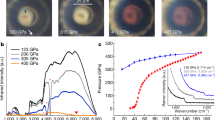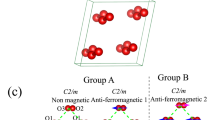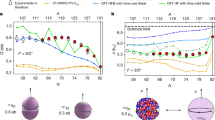Abstract
NUCLEAR magnetic resonance can be used for studying the motions of molecules absorbed on surfaces. In this connexion proton-resonance derivative line-shapes have been obtained for methane adsorbed on titanium dioxide at various coverages from 0.1 to 4.0 monolayer, and also in bulk methane, as a function of temperature. The surface area of the titanium dioxide, determined by the BET method, was 230 m.2/gm.
This is a preview of subscription content, access via your institution
Access options
Subscribe to this journal
Receive 51 print issues and online access
$199.00 per year
only $3.90 per issue
Buy this article
- Purchase on Springer Link
- Instant access to full article PDF
Prices may be subject to local taxes which are calculated during checkout
Similar content being viewed by others
References
Thomas, J. T., Alpert, N. L., and Torrey, H. C., Phys. Rev., 18, 1511 (1950).
Alpert, N. L., Phys. Rev., 75, 398 (1949).
Tomita, K., Phys. Rev., 89, 429 (1953).
Pauling, L., Phys. Rev., 36, 430 (1930).
Author information
Authors and Affiliations
Rights and permissions
About this article
Cite this article
FUSCHILLO, N., RENTON, C. Nuclear Magnetic Resonance of Methane adsorbed on Titanium Dioxide. Nature 180, 1063–1064 (1957). https://doi.org/10.1038/1801063a0
Issue Date:
DOI: https://doi.org/10.1038/1801063a0
Comments
By submitting a comment you agree to abide by our Terms and Community Guidelines. If you find something abusive or that does not comply with our terms or guidelines please flag it as inappropriate.



